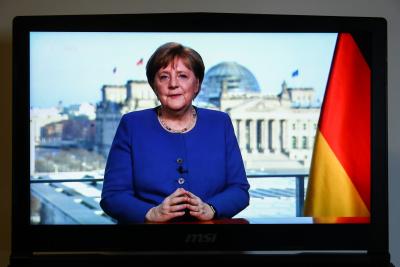Germany braces for 'new normal'
By IANS | Published: April 19, 2020 03:10 PM2020-04-19T15:10:32+5:302020-04-19T15:20:11+5:30
Germany is bracing toward what has been dubbed "a new normal" amid the coronavirus pandemic with the relaxation of some of the restrictive measures in place to stop the transmission of the disease.

Germany braces for 'new normal'
Berlin, April 19 Germany is bracing toward what has been dubbed "a new normal" amid the coronavirus pandemic with the relaxation of some of the restrictive measures in place to stop the transmission of the disease.
Commercial spaces less than 800 metres squared will be permitted to reopen in some federal states from Monday, while others will open later, reports Efe news.
Schools will also gradually resume activities, albeit with restrictions in place.
In the capital Berlin, some secondary school students will sit their finals and from May 4 other age groups will return to the classroom but class sizes will be reduced.
The fight against the pandemic, according to Chancellor Angela Merkel, has not yet been won but Germany has succeeded in slowing its infection rate to a point that currently will not overwhelm the healthcare system.
The gradual easing of restrictions marks a new chapter in the country's campaign against COVID-19, which began when Germany was alerted to its first case on January 27.
The outbreak properly took hold a month later when new cases were registered in Bavaria, Baden-Württenberg and North Rhine Westphalia.
The first federal-level restrictions came into effect on March 8 and later reinforced on 16 and March 23.
The package of measures approved on March 23, which have some variation from federal state to federal state, is what has helped slow the virus, experts say.
In reality Germany has managed to keep its infection rate lower than the vast majority of affected countries, mainly by advising that people avoid unnecessary contact.
Its citizens have been allowed to leave their house but only with the people they live with or with groups of no more than two people. Unlike countries like Spain, they are not restricted to buying food or pharmaceuticals, but can go for a walk or exercise in the open air.
Authorities recommend that people maintain a social distance of around 1.5 metre, government advice that is expected to remain in place as the country eases its lockdown.
Bavaria's Minister-President Markus Söder has said he cannot imagine Munich's world-renowned Oktoberfest going ahead in the autumn as usual.
Large public gatherings have been banned in Germany until at least August 31 and the measure will likely be extended.
In Saxony, authorities were to make the use of masks obligatory. In other states they have been recommended but not enforced.
( With inputs from IANS )
Open in app